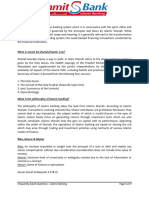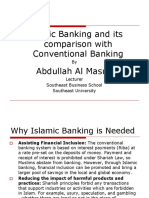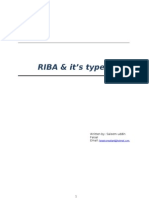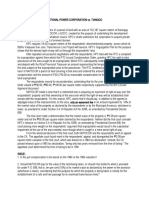Islamiyat Project
Islamiyat Project
Uploaded by
sarfarazjutt932Copyright:
Available Formats
Islamiyat Project
Islamiyat Project
Uploaded by
sarfarazjutt932Original Description:
Original Title
Copyright
Available Formats
Share this document
Did you find this document useful?
Is this content inappropriate?
Copyright:
Available Formats
Islamiyat Project
Islamiyat Project
Uploaded by
sarfarazjutt932Copyright:
Available Formats
INTEREST :
Interest, in the context of finance and economics, is a complex topic in Islam. The
Arabic term for interest is "riba," which is prohibited in Islamic law (Shariah). Islamic scholars
and jurists have interpreted riba to mean excessive or exploitative interest, which is considered
unjust and harmful to society. Riba is a concept in Islamic banking that refers to charged
interest. It has also been referred to as usury, or the charging of unreasonably high-
interest rates. There is also another form of riba, according to most Islamic jurists,
which refers to the simultaneous exchange of goods of unequal quantities or qualities.
Here, however, we will be referring to the practice of charged interest.Allah says in
Quran:
"And whatever you give for Riba in order that it may increase in people’s wealth, it will not
increase in the sight of Allah; and whatever you give for Zakat, seeking Allah’s pleasure, it is
they who are the multipliers (to get manifold reward)." Al-Quran 30:39.
And in the other place in Quran,Allah says:
"The standing of those who eat Riba is like standing of the one who is confounded by Devil’s
stroke – that’s because they say trade is just like Riba, whereas Allah has permitted trade and
forbidden Riba. Hence those who have received the admonition from their Lord and desist,
may keep their previous gains, their case being entrusted to Allah; but those who revert shall
be the inhabitants of the fire and abide therein forever." Al-Quran 2:275
Some types of interest according to Islam are written below:
1. Riba al-Nasi'ah (Excessive Interest).
2. Riba al-Hadith (Verbal Interest).
3. Riba al-Sarf (Interest on Currency Exchange).
4. Riba al-Jahiliyah (Usury).
Riba al-Nasi'ah (Excessive Interest):
Riba al-Nasi'ah (Excessive Interest) is a type of
interest that is prohibited in Islam. It refers to the excess amount paid by a borrower to a lender
over and above the principal amount borrowed, as a condition of the loan. This type of interest
is considered exploitative and unjust, as it leads to debt slavery and financial burden on the
borrower.For example,
Let’s say you borrow $100 from a friend to buy a new phone, and you agree to pay back $120
after a year.
In this example:
The principal amount borrowed is $100. The excess amount paid (interest) is $20 ($120 - $100)
This $20 is considered Riba al-Nasi'ah, as it is an excess amount paid over and above the
principal amount borrowed. This type of interest is prohibited in Islam.
In Islamic finance, the lender would only receive the principal amount of $100, without any
additional interest or excess. This ensures that the lender does not benefit at the expense of
the borrower, and that the borrower is not burdened with excessive debt.
REFERENCE LINK:
https://www.islamicfiqh.net/en/articles/two-riba-al-nasiah-ie-increase-for-a-delay-115
Riba al-Hadith (Verbal Interest):
Riba al-Hadith (Verbal Interest) is a type of interest
refers to the practice of charging interest on a loan or debt without a written contract or
agreement. This type of interest is considered verbal or implicit, as it is not explicitly stated in a
written contract, but is rather implied or understood through verbal agreements or customs.
Riba al-Sarf (Interest on Currency Exchange):
Riba al-Sarf (Interest on Currency
Exchange) is a type of interest that is prohibited in Islam. It refers to the excess amount paid or
received when exchanging currencies, where the exchange rate is not based on the actual value
of the currencies, but rather on a predetermined rate that favors one party over the other.In
other words, Riba al-Sarf occurs when a person exchanges one currency for another, and the
exchange rate is not 1:1, but rather includes an additional amount that is considered interest.
For example,
Suppose you want to exchange $100 USD for Euros. The actual exchange rate is 1 USD
= 0.88 Euros. However, the exchange broker offers you an exchange rate of 1 USD = 0.85 Euros,
and also charges you an additional 2% "fee" on the transaction. In this example, the excess
amount paid (0.03 Euros per USD) and the additional 2% "fee" are considered Riba al-Sarf
(Interest on Currency Exchange), as they represent an excess amount paid over and above the
actual value of the currencies.
REFERENCE LINK:
https://islamicsystem.blogspot.com/2012/09/riba-and-currency-exchange-sarf.html
Riba al-Jahiliyah (Usury):
Riba al-Jahiliyah (Usury) is a type of interest that was prevalent in
the pre-Islamic era, particularly in Arabia. It refers to the practice of lending money at
exorbitant interest rates, often without any consideration for the borrower's ability to repay.
This type of interest was considered exploitative and oppressive, as it led to debt slavery and
financial burden on the borrower.In the pre-Islamic era, lenders would charge extremely high
interest rates, often exceeding 100% per annum, and would demand collateral or guarantees
from the borrower. If the borrower failed to repay the loan, the lender would seize the
collateral and sell it to recover the debt, often leaving the borrower in a state of financial ruin.
For example,
Let's say Abdullah needs to borrow $1,000 to pay for his daughter's wedding. A lender,
Khalid, agrees to lend him the money, but charges an interest rate of 50% per annum,
compounded annually. This means Abdullah will owe Khalid:
$1,000 (principal) + $500 (interest) = $1,500 after one year
If Abdullah is unable to repay the loan, Khalid demands collateral, such as Abdullah's house or
business, to recover the debt.
In this example, Khalid is practicing Riba al-Jahiliyah (Usury) by:
Charging an exorbitant interest rate (50% per annum).Demanding collateral or
guarantees.Exploiting Abdullah's financial desperation
This type of lending is prohibited in Islam, as it leads to debt slavery, financial burden, and
exploitation.
REFERENCE LINK:
https://islamweb.net/en/article/157155/riba-usury-in-islam
You might also like
- Constitution, Constitutional Law and Politics Bangladesh Perspective - Abdul HalimDocument545 pagesConstitution, Constitutional Law and Politics Bangladesh Perspective - Abdul HalimMd Ahsan-Ul- Kabir100% (1)
- Islamic Finance - Relevant For ACCA Paper F9 and P4Document17 pagesIslamic Finance - Relevant For ACCA Paper F9 and P4Abigail CharlesNo ratings yet
- Riba in IslamDocument2 pagesRiba in Islamibrahimabdulmalik707No ratings yet
- RibaDocument50 pagesRibafarhan israrNo ratings yet
- Riba and Its Types: Mian Ahmad Sajjad ShabbirDocument6 pagesRiba and Its Types: Mian Ahmad Sajjad ShabbirMian Ahmad Sajjad ShabbirNo ratings yet
- Islamic Finance - TonyDocument18 pagesIslamic Finance - TonylimNo ratings yet
- Theory of Riba (Differences Between Conventional Personal Financing and Islamic Personal Financing)Document20 pagesTheory of Riba (Differences Between Conventional Personal Financing and Islamic Personal Financing)millimilNo ratings yet
- Riba. Hassan Durrani, BBA, Group-B, 5thDocument7 pagesRiba. Hassan Durrani, BBA, Group-B, 5thLebbe PuthaNo ratings yet
- Islamic Banking Theories and PracticesDocument13 pagesIslamic Banking Theories and PracticesUzmanNo ratings yet
- The Prohibition of Riba (Usury) : Dr. Mohammed Alwosabi BANK 411Document15 pagesThe Prohibition of Riba (Usury) : Dr. Mohammed Alwosabi BANK 411rajinraj2No ratings yet
- Interest Vs ProfitDocument2 pagesInterest Vs ProfitAdnan MemonNo ratings yet
- Mubashir Ameenudeen IFDocument6 pagesMubashir Ameenudeen IFLebbe PuthaNo ratings yet
- The Meaning and Definition of RibaDocument11 pagesThe Meaning and Definition of RibasurrenNo ratings yet
- RIBA and Its CausesDocument17 pagesRIBA and Its CausesLaRa AdYan0% (1)
- Prohibition of Usury in ShariahDocument29 pagesProhibition of Usury in ShariahLalith KumarNo ratings yet
- ESSAI INGGRIS Sulthan Akmal FirdausDocument4 pagesESSAI INGGRIS Sulthan Akmal FirdausAkmal FirdausNo ratings yet
- The Concept of Riba in Islam DocumentationDocument2 pagesThe Concept of Riba in Islam Documentationumar03029452584No ratings yet
- Maryam - 84 - 4124 - 1 - Lecture 1Document30 pagesMaryam - 84 - 4124 - 1 - Lecture 1Mustafa LakhaniNo ratings yet
- Chapter 2 Riba and InterestDocument37 pagesChapter 2 Riba and InterestMd. Abdul HalimNo ratings yet
- TUTORIAL 10 Sugegsted AnswerDocument5 pagesTUTORIAL 10 Sugegsted AnswerJason T. NathanNo ratings yet
- Islamic Banking Is HaramDocument7 pagesIslamic Banking Is HaramimranNo ratings yet
- Islamic Banking and Its Comparison With Conventional Banking Abdullah Al MasudDocument34 pagesIslamic Banking and Its Comparison With Conventional Banking Abdullah Al MasudAAM26No ratings yet
- RIBA (Bscom21-681)Document3 pagesRIBA (Bscom21-681)imjunaid46No ratings yet
- Group 8 RibaDocument30 pagesGroup 8 RibaArif Suhaimi AripozzNo ratings yet
- IB FAQ EnglishDocument7 pagesIB FAQ EnglishziafmcsNo ratings yet
- Assignment 1Document3 pagesAssignment 1omaimaaamir9No ratings yet
- Fiqh-ul-Mauamlat: Islamic Banking and FinanceDocument4 pagesFiqh-ul-Mauamlat: Islamic Banking and Financehaiqa malikNo ratings yet
- Consider A Simple Loan ExampleDocument2 pagesConsider A Simple Loan Examplegeena1980No ratings yet
- Final Book..islamic Finance SystemsDocument180 pagesFinal Book..islamic Finance SystemsKansohmi KansNo ratings yet
- Broad Distinction Between Islamic ConventionalDocument18 pagesBroad Distinction Between Islamic ConventionalShoaib CheemaNo ratings yet
- Islamic Banking Assignment#2Document4 pagesIslamic Banking Assignment#2omaimaaamir9No ratings yet
- Literature Review PDFDocument10 pagesLiterature Review PDFsrishtiNo ratings yet
- Prohibition of InterestDocument10 pagesProhibition of Interesttoufeeqjamal908No ratings yet
- Chap 3 #Document14 pagesChap 3 #Yoo ChueningNo ratings yet
- Riba and A General Theory of InterestDocument13 pagesRiba and A General Theory of InterestShamsi_adnanNo ratings yet
- TUTORIAL 3 (Answer)Document5 pagesTUTORIAL 3 (Answer)YASMIN HUMAIRA BINTI ASZAHAM UnknownNo ratings yet
- Islamic BankingDocument9 pagesIslamic BankingĦøşęħ ÖżįlNo ratings yet
- Shadman Haider, Islamiyat, BS 2B PDFDocument4 pagesShadman Haider, Islamiyat, BS 2B PDFShaista KhattakNo ratings yet
- Understanding & Calculating Zakah: 1stethical Charitable Trust'SguidetoDocument9 pagesUnderstanding & Calculating Zakah: 1stethical Charitable Trust'SguidetoidamielNo ratings yet
- Islamic Banking and Finance NotesDocument20 pagesIslamic Banking and Finance NotesICBS EducationNo ratings yet
- Lec-Islamic Banking-IntroductionDocument21 pagesLec-Islamic Banking-IntroductionIbrahim BadshaNo ratings yet
- Islamic Financial SystemDocument15 pagesIslamic Financial SystemFarfoosh Farfoosh FarfooshNo ratings yet
- Social ArticlesDocument3 pagesSocial ArticlesAyaz Saa'irNo ratings yet
- IB - A New Era of FinancingDocument22 pagesIB - A New Era of FinancingMoNa AlamgirNo ratings yet
- Credit Operations and Risk Management in Commercial BanksDocument4 pagesCredit Operations and Risk Management in Commercial Bankssn nNo ratings yet
- Islamic Banking and Its Comparison With Conventional Banking Abdullah Al MasudDocument34 pagesIslamic Banking and Its Comparison With Conventional Banking Abdullah Al MasudDevid LuizNo ratings yet
- Islamic and FinanceDocument7 pagesIslamic and Financemaryamnoorrr13No ratings yet
- Session OneDocument90 pagesSession OneMustafe MohamedNo ratings yet
- Fatawa Currency and InflationDocument16 pagesFatawa Currency and InflationISLAMIC LIBRARYNo ratings yet
- Riba Interest ProfitDocument39 pagesRiba Interest ProfitDaniyal75% (4)
- Wa0007.Document9 pagesWa0007.fatimajawadfatimajawad4No ratings yet
- Are All Forms of Interest Prohibited?: Islamic Economics Research Center King Abdul Aziz University, Jeddah, Saudi ArabiaDocument5 pagesAre All Forms of Interest Prohibited?: Islamic Economics Research Center King Abdul Aziz University, Jeddah, Saudi ArabiaAdhiyanto PLNo ratings yet
- Itrest & Types 7Document31 pagesItrest & Types 7bilal1434No ratings yet
- Sukuk 6Document22 pagesSukuk 6salahhamoudaNo ratings yet
- Riba and A Reason Fo BaningDocument5 pagesRiba and A Reason Fo BaningJaffari KesowaniNo ratings yet
- The Difference Between Riba-Based Banks and Islamic BanksDocument3 pagesThe Difference Between Riba-Based Banks and Islamic BanksBralekNo ratings yet
- RIBA and It's TypesDocument10 pagesRIBA and It's Typesfaisalconsultant100% (2)
- Riba and Islamic Banking and FinanceDocument23 pagesRiba and Islamic Banking and FinanceKhalids MusaNo ratings yet
- 15 Laws of Money: The Strangest Secrets The Super-Rich Don't Want You to KnowFrom Everand15 Laws of Money: The Strangest Secrets The Super-Rich Don't Want You to KnowNo ratings yet
- manual gerber accumark gerber 16Document12 pagesmanual gerber accumark gerber 16ϻẸŇÃ. ČǗŤẸ.No ratings yet
- Chapter 7Document7 pagesChapter 7gicf.agent47No ratings yet
- Letter Request DonationDocument5 pagesLetter Request DonationAlvin BugayongNo ratings yet
- Documentary Requirements On CSHPDocument4 pagesDocumentary Requirements On CSHPGregor Clegane100% (1)
- Herald 1st Sem Issue School Year 2013-2014Document20 pagesHerald 1st Sem Issue School Year 2013-2014Anabel Quinto Sta CruzNo ratings yet
- A Presentation On Financial Statement Analysis of HulDocument16 pagesA Presentation On Financial Statement Analysis of HulArpita sarangiNo ratings yet
- Electrostatics: OpposesDocument5 pagesElectrostatics: OpposessgohbNo ratings yet
- DBQ EssayDocument3 pagesDBQ Essayapi-319153490No ratings yet
- Staff MattersDocument908 pagesStaff MattersPiyush BajpaiNo ratings yet
- GST Research ProjectDocument110 pagesGST Research ProjectHarshvardhini MunwarNo ratings yet
- BUBONGcasedigestOCt24BusOrgArellano PDFDocument3 pagesBUBONGcasedigestOCt24BusOrgArellano PDFAlyssa Khayra McNo ratings yet
- Mga Bansa at KatawaganDocument7 pagesMga Bansa at KatawaganPearl Bill RamosNo ratings yet
- #53 Napocor v. TiangcoDocument2 pages#53 Napocor v. TiangcoKristine EnriquezNo ratings yet
- Memo Writing - Lay Out and Sample of A MemoDocument7 pagesMemo Writing - Lay Out and Sample of A Memonasrafafid998No ratings yet
- Tecson House Package FinalDocument15 pagesTecson House Package FinalAva AvionaNo ratings yet
- Wide Band Communication PVT LTD - Psid# 37347217 (2015)Document1 pageWide Band Communication PVT LTD - Psid# 37347217 (2015)Asif JavidNo ratings yet
- COST ACCOUNTING - Labor, Manufacturing OverheadDocument3 pagesCOST ACCOUNTING - Labor, Manufacturing OverheadnishaNo ratings yet
- International StandardDocument18 pagesInternational Standardalvaro cardenas100% (1)
- The Rulings of Menstruation and Postpartum Bleeding 1Document100 pagesThe Rulings of Menstruation and Postpartum Bleeding 1toothfairynansNo ratings yet
- Augustus Neander - The Life of Jesus Christ in Its Historical Connection & DevelopmentDocument540 pagesAugustus Neander - The Life of Jesus Christ in Its Historical Connection & DevelopmentMick RynningNo ratings yet
- Haney v. Scientology: SCOTUS Reply From CSI and RTCDocument45 pagesHaney v. Scientology: SCOTUS Reply From CSI and RTCTony OrtegaNo ratings yet
- Notice by Affidavit of Nefarious Acts Through Use of BAR Members and Associations and Federal Program FraudDocument5 pagesNotice by Affidavit of Nefarious Acts Through Use of BAR Members and Associations and Federal Program Fraudcas90% (10)
- Times Leader 04-11-2011Document17 pagesTimes Leader 04-11-2011The Times LeaderNo ratings yet
- Ratio Analysis NepalDocument10 pagesRatio Analysis NepalDeep KrishnaNo ratings yet
- Bulgaria's Commerce ActDocument219 pagesBulgaria's Commerce Actswenswen100% (1)
- People Vs AlemanDocument1 pagePeople Vs AlemanTootsie GuzmaNo ratings yet
- ReflectionDocument2 pagesReflectionJenevie BalerNo ratings yet
- CrimPro Salvador - Search and SeizureDocument41 pagesCrimPro Salvador - Search and SeizureJohn VillaverNo ratings yet
- Security Bank V RTC Makati 263 SCRA 453 1996Document3 pagesSecurity Bank V RTC Makati 263 SCRA 453 1996Xyrus Bucao100% (1)

























































































